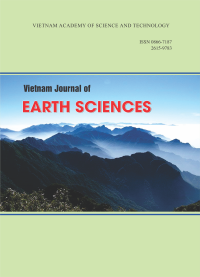Determination of drainage corridor in the downstream Vu Gia - Han river, Da Nang city
Author affiliations
DOI:
https://doi.org/10.15625/0866-7187/41/1/13546Keywords:
Flood drainage corridor, inundation, MIKE model, GIS, Vu Gia – Han, Da Nang cityAbstract
Flood is one of the most well-known phenomena in the Central Vietnam where Da Nang city is located. As the most area in the central coastal part, this city frequently suffers to flood without any prevented structure like sea dike or river levee. The only thing that can help to the response for flood is emergency plans. Therefore, flooding still causes great damages to the economic development and social stability in this region. For ensuring the sustainable development of Da Nang city under the impacts of climate change and sea level rising, it requests a change in direction of the solution, from the flood control to the adaptation and living with floods through spatial planning to make a good condition for optimal drainage corridors. This paper suggests a design flood drainage corridors for Da Nang city that was developed by combining of mathematical model, GIS, hydro-meteorological documents of Vu Gia - Thu Bon basin from 2009 to present. These proposal solutions include (i) widening of the riverbed and providing a river corridor protection along both river banks; (ii) creating of drainage channels for the land between the rivers and (iii) creating of space for floodwater in an appropriate time. The result was so good and it helps to reduce the flood in Da Nang from 5% to 10%. Therefore this would be a scientific basis for identifying the flood drainage corridors of other river basins in the central coastal region without typical dike cover.
References
Bruun et al., 2013 On the Frontiers of Climate and Environmental Change: Vulnerabilities and Adaptation in Central Vietnam, Springer Verlag, Berlin, Germany.
CCFSC (Central Committee for Flood and Storm Control), 2005. “National Report on Disasters in Vietnam.”, the World Conference on Disaster Reduction, January 18–22, Kobe-Hyogo, Japan.
Da Nang Statistical Office, 2016. Statistical Yearbook, Statistical publishing house, Hanoi.
Da Nang University of Science and Technology, 2014. Project of Da Nang Hydrology and Urban Development Simulation Model supported by Rockefeller, Stored report of the Climate Change Coordination Office, Da Nang.
Da Nang City Steering Board for Storm and Flood Prevention and Search and Rescue, Resume of the Flood Prevention and Search and Rescue works from 2000 to 2016, Stored report of the Office of People’s Committee of Da Nang city.
Dang Thi Kim Nhung, 2016. Review of flood prevention planning in the central provinces from Quang Binh to Binh Thuan. Proceedings of the 55th anniversary of InstituteofWater Resources Planning, Hanoi.
Decision No. 2357/QD-TTG dated 04 December 2013 approving the adjustment of general planning of Da Nang city by 2030 with a vision toward 2050.
Decree No. 43/2015/ND-CP dated on 6 May 2015. Hanoi establishment and management of water source protection corridors.
DHI Dan Mach, 2011. MIKE 11(RR+HD) - A Modelling system for rivers and channels, User guide.
DHI Dan Mach, 2011. MIKE 21- Flow Model FM, User guide.
Dinh Phung Bao, 2013. The study using GIS for flood prevention mapping system in Vu Gia-Thu Bon river basin, Stored report of the Mid-Central regional hydrometeorological center, Da Nang.
FEMA, 1995. Managing Floodplain Development in Approximate Zone A Areas - A Guide for Obtaining and Developing Base Flood (100-year) Flood Elevations - FEMA 265.
Floodway: https://www.fema.gov/floodplain-management/floodway#0.
Hoang Ngoc Tuan, 2016. Comprehensive assessment of resistance of surface water resource to the climate change of the city, Stored report of Climate Change Coordination Office, Da Nang.
Hoang Thai Binh, 2017. Determination of flood drainage corridor in the downstream area of Vu Gia - Thu Bon river (in Da Nang city) when the hydropower system in the upper in operation in the context of climate change. Final report of project’s code VAST-NĐP.12/15-16, Hanoi.
JICA, 2009. Report Project for Building Disaster Resilient Societies in Central Regions of Vietnam.
LUCCI, 2015. Study on the land use and climate change interactions in Central Vietnam, http://www.lucci-vietnam.info/vn/.
Ministry of natural resources and environment, 2016. Climate change, sea level rise scenarios for Vietnam.
NRWA Waterways Section And BG&E Pty LTD, 2006. Floodway Design Guide, Government of Western Australia.
Nguyen Kim Loi, 2016. The support system for Flood warning (case study in Vu Gia - Thu Bon river basin, Quang Nam province), Agricultural Publishing House, Hanoi.
SRV (Socialist Republic of Vietnam), 2007. National Strategy for Natural Disaster Prevention, Response and Mitigation to 2020. November 16. Hanoi, Vietnam
Tran Tuan, Bui Dung, 2012. The.Natural Disasters in Vietnam A SYNTHESIS FROM A SOCIOECONOMIC PERSPECTIVE, 179-198.
Vu Thi Thu Lan, 2011. Field survey and hydraulic modeling of Thu Bon river basin, Quang Nam province, Stored report of Steering Board for Storm and Flood Prevention of Quang Nam.
Vu Thi Thu Lan, 2013. Flood prevention mapping of Vu Gia-Thu Bon river and Thach Han-Ben Hai river in scale 1/10.000. Stored report of Office for Water Resources Projects, Ministry of Agriculture & Rural Development, Hanoi.
Vu Thi Thu Lan, 2013. The study of natural disasters variation (floods and droughts) in Quang Nam in the context of climate change, J. Sci. of the Earth, Hanoi, 35(1), 66-74.
World Bank, 2012. Fiscal Impact of Natural Disasters in Vietnam, http://www.worldbank.org/fpd/drfip.






